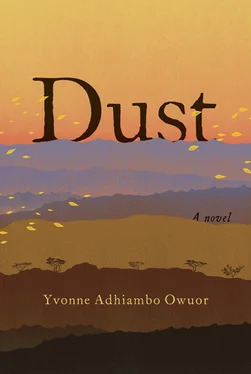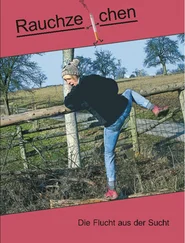Three days later, nobody had shown up yet.
Not his problem.
Doum palms rattle; he hears the woman laugh, so he moves closer to see if she is conscious. He finds stillness, a reclining caryatid. Isaiah stares. Stirring of recognition besieged by flickering images, song portions, and old words, almost knowing … what? The night fire sputters. When Isaiah turns, he sees through its embers a mirror of the scorching hole in his heart. A muted groan: What in hell am I doing here? What has my mother to do with this forsaken realm?
THE TRADER, WUOTH OGIK’S NEWEST VISITOR, HICCUPS “THEE-THEE-THEE-THEE” over a joke he alone grasps. He had returned with Galgalu, who had shambled over to his corner of the land and told him the current season’s story in six lines:
Police in down-country Kenya had murdered Moses Odidi Oganda.
Akai Lokorijom had fled Wuoth Ogik with the old car.
A rabid d’abeela had implanted a death wound into Galgalu’s soul, which needed to be exorcised.
Nyipir was breaking rocks to build a cairn for Odidi, who could not be buried until Akai-ma had returned.
Sorrow had swallowed Arabel Ajany, who was now like one of the dead.
A man named Bolton had shown up at Wuoth Ogik with a question: Where’s my father?
The Trader is a bald-headed, medium-sized harlequin with jutting-out ears and a straggling beard like the land’s thornbushes. He templed his fingers and considered the wealth of events. He wondered how to weave himself into the center of the tales. Pouring words into his ears was a beige-leather-covered shortwave radio that seemed to have been cemented into his shoulder. He listened, he considered everything, and then he packed in haste, eager to get to Wuoth Ogik.
The Trader knows neither where he was born nor who his father was. He has hazel eyes and a skin tone that changes with the seasons, place, and circumstances in which he finds himself. He suspects his father might be the old Kenyan Punjabi trader who once lived in Ethiopia, or the embittered illegitimate son of a murderous and psychotic Greek trader. He knows about one of his great-great-grandfathers on his mother’s side, a failed Arab slaver whose human cargo had died of dehydration in Bagamoyo, and who, to escape creditors, had fled northward until he collapsed and was saved by a widow whom he married. The Trader was raised as a shared son among the twilight women of Garissa, who skirted borders of orthodoxy and hypocrisy in a blur of clove-oil scents and cinnamon gestures, mwarubaini portions and oud . He went to the school under the Mareer tree. Because his genealogy stank, his head teacher ignored him. He preferred herding goats anyway. He left school at fourteen, stole his first radio from the stuffed bag of a nervous passenger, and found two things: a porthole to a universe, and the realization that by listening deeply he could manage the world.
He became duddaani-nyaatte , a desert peddler who carried goods on his back. His wanderings brought him a deep and wide relationship network. Because he listened, he discovered what people wanted to hear. He also had money to lend at exorbitant interest rates. Shamed borrowers sold him secrets for relief. One of them, a former Coptic priest, had given him nine formulae for blending coffee, nine secrets of intent that delivered the scent to nine places of the distressed soul. He also started to change and retell some of the stories he had heard on the radio. In time, people came to him to confirm or deny what they had heard in the news. He had already obtained four passports by then, two of which were Kenyan. He spoke all the tongues of the desert, mimicked accents and postures, dialogued in the gist of some European languages, including Croatian, adjusting words to suit his hearing, and adopted so many names that, except for him, almost everyone forgot he used to be Zaman Nawfal. Nyipir does not know he was Zaman Nawfal, and Nyipir knows most of everything in those northern lands.
He showed up at Wuoth Ogik that day on a Rendille camel bearing assorted goods, including a Chinese-made Uzi and a five-stringed Spanish guitar. Now his thee-thee-thee-thee jounces his shoulders. From time to time he tilts his head and nods as if picking up an old conversation from his radio, before returning to his audience. He tells his audience that a man from Ghana named Choffeur had sent another, named Kofi Annan, to save Kenya. Kofi had in turn invited “Haninant Parsons.”
Galgalu wonders, “So many to save a country — there must be something good here.”
“Thee-thee-thee-thee.”
Nyipir leans forward, “What news of Agwambo? Is he alive?”
The Trader lays out his paraphernalia and stops to tap his chin. “It is possible. Me, I only repeat what the radio says.”
Galgalu asks, “Chibaki — you know him?”
The Trader purses his lips, his eyes narrow. “I sold him two camels — no, no, three.”
“If a man knows camels, he must be agreeable,” Galgalu suggests.
The Trader nods. “But here is a question: are the camels still living?” The Trader sighs. “ Aieee! Godless news.”
His audience waits.
“A fisherman left his home on the day after the counting. He went to Lake Naivasha. You know the one I mean? He left his wives — there were two, and eight children in their house. But when he was on the water, neighbors wrote out his name and those of his wives and children. Neighbors whom he brought fish. They wrote out his name and gave it to demons that came to seal his house, pour petrol, strike a match, and dance while the family inside died screaming. Those neighbors watched. They ate food.”
Red glow of desert light.
Silence made of revulsion.
Nyipir sits very still.
He has seen this before.
Touched it.
Hidden it.
His mind tumbles back to a different time, when brother, son, mother, father sealed family members in rooms and huts and set these alight in honor of covenants of terror that guaranteed silence: If I speak, may the oath kill me . Much later, the horror was painted over and replaced with myths of triumph, repeated, repeated again, then adorned in all seasons of retelling. Nyipir waited for the inheritors of these silences to call out the names of their undead dead. Not a word. Now, fifty years later, the murdered were shrieking from earth tombs of enforced, timeless stillness, wailing for their forgotten, chopped-up lives. They seemed to accuse every citizen inheritors of their hemorrhaging. Nyipir shivers, chilled. He looks over his shoulder.
The Trader continues. “When those firestarters opened the door to see what they had done, the first one in witnessed the bursting open of the second wife’s womb. And the child leaned out to look at the man. It turned its head. It died.” The Trader says, “Now that one runs up and down looking for priests to cleanse him.”
“Who delivers men like those?” Galgalu covers his mouth.
A hum in his ears, Nyipir mutters a confession: “Long ago, I carried Kenya’s flag. It was not so heavy then.”
The Trader nods.
The Trader is a gatherer and carrier of stories. He collects secrets, a source of income, a pleasurable economy. He cannot endure not knowing. Every memory, even borrowed ones, are his. Sometimes he distributes these when he needs to, and always for a profit. The Trader trades in names, but never with his.
Misery had brought Nyipir to the Trader, in 1970. Over fourteen lucent nights, the Trader had sung soft songs to return the right rhythm to Nyipir’s heartbeat, and then convinced Nyipir’s soul to trust human life again, explaining that what had happened was not Nyipir’s fault. Afterward, the Trader had taken names Nyipir had known and written and made him recite these until they became soft to the taste, which meant that Nyipir was no longer indebted to the disappeared.
Читать дальше











